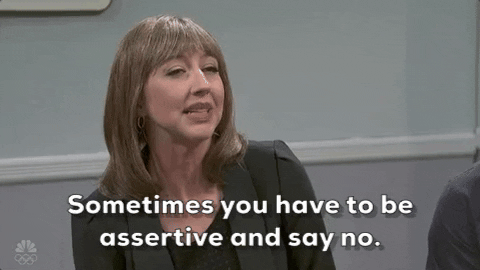When you know you no
I’m sure many of you have heard of the concept (and book) espousing the virtues of saying “no” more. Why should we say no more? Many people I work with are overburdened. A major cause is not being able to say no. I get it. I was advised (when starting this business five years ago) to “Say yes to everything until you’re in a position to say no.” That advice has some merit, but it delayed progress, impacted family, and harmed health.
I also understand the pressure and fear associated with incentives, job security, fires that need putting out, etc. I spent 13 years in an environment where if we didn’t hit numbers (utilisation, billing, meetings, etc.), we’d lose out (bonuses to firing). In that context, saying “no” seemed self-sabotage. But actually, it would have saved a LOT of time and increased productivity.
So when, how, and to whom should we say no? Let’s start with whom to say no to. I will cover how and when in the following two newsletters.
I’d start by saying no to those leveraging guilt, creating chaos, or furthering inequity.
Guilt: I’ve mentored 25+ people in the past three years. Most have been lovely. A couple have been challenging. One person approached the mentoring relationship with the expectation that I should help them “get a leg up” by giving away all of the risk assessment tools I’d built for free and training them on how to use them to jump-start their rival business. This occurred as Covid bit, and their rationale played on guilt (gender, race, locational income disparity). It was hard to say no.
Chaos: Another mentee was always in a panic, poorly organised, wanting last-minute calls, and then would ghost appointments. A few weeks ago, they sent a brief email (after a few years of silence) saying, “Hey, I am looking for work in Europe. Can you… [open up your hard-earned network and introduce them to me.]” It wasn’t pleasant, but a no was needed.

Equity: Then some folks want (regular) free advice, competitors fishing for ideas, fair-weather collaborators, requests for out-of-scope work or additional requests from those with poor payment histories, and those pushing conferences and publications. Saying no here depends. My metric is simple:
“Fool me once, shame on you; fool me twice, shame on me.”
I trust but verify. I might meet with people once, go the extra mile, or write that article (assuming it’s a legit publication). But I’ve learned to go in with clear ground rules, including:
Effort: specify limits from the start (e.g., one free 45-minute strategy call, 30-minute presentation on topic X, etc.).
Roles and goals: who will do what and defining outcomes (important in mentoring or informal agreements).
Costs: e.g., 50% downpayment on all project work.
Benefit: you’re making money, but what’s in it for me? (e.g., speaking fees, attendee lists, readership data, promoting the book, etc.).
Without precise specifications and agreement on the relevant parameters, it’s a “no.” Remember, saying “no” is not a sign of weakness but a way to protect your time, energy, and resources and ensure you are not exploited.
I appreciate that saying no to those with power (bosses especially) may be challenging, but try these next time:
💡 Why this? Politely ask them to explain why this issue is a priority. Mirroring language can help here. “If we don’t finish this this week, it could be a major problem.” “A major problem?” Usually, with some mirroring language, we can bargain down the panickers from imminent doom to something more realistic.
💡 Why now? Often, asking a few probing questions will reveal a world of assumptions (or decisions they must own). For instance, “We need to get this to Senior Leader X by tomorrow.” Ask: When did the leader ask for it? Did they specify they needed it tomorrow? Is there any particular reason why (e.g., a board meeting)? Could we do a 15-minute call instead to brief them, and your team could summarise the call into a few bullet points for them?
💡 Why me? For those requests from responsibility-dodgers, push back, as this can be difficult to justify. What you’re saying with this is, “Why not you?”
💡 Costs & constraints: Explain your time, budget, or other parameters. Reason is suitable for people who haven’t considered the effort (and cost-benefit) associated with their request. “I could do X, but then I’ve have to stop doing Y.”
Then there’s the scary (for many of us) final “no.” Saying no because you don’t want to.
In some contexts, requests don’t work for us. Last weekend, a collaborator on a project wanted a call on Sunday morning, as they’d let the previous week get away from them. I said, “No. That doesn’t work for me.” I was taking my son climbing, but they don’t need to know that. We don’t (always) owe people explanations.
Being firm is an act of self-care and self-respect. Other people need to learn to own their messes. They won’t until we start saying “no” more.
